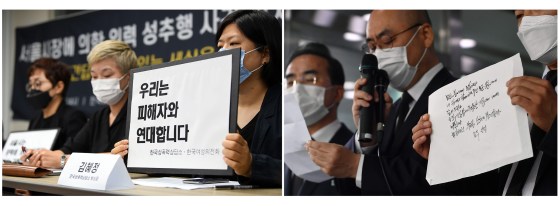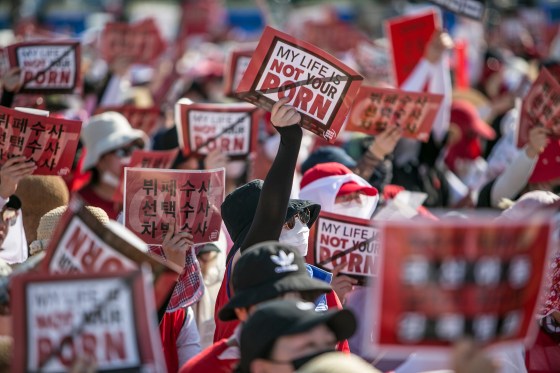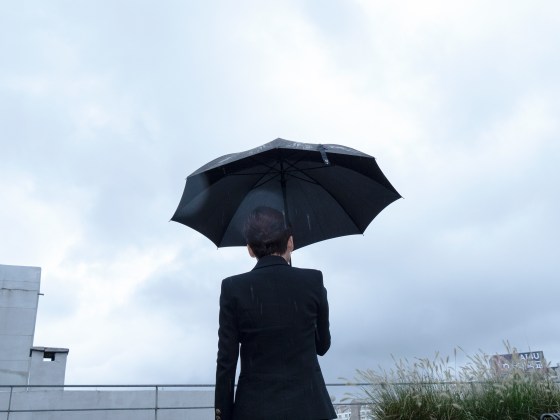New top story from Time: Seoul’s Mayor Championed Women’s Rights. The #MeToo Allegations Against Him Have Bitterly Divided Korea

Lee Eun Kyung remembers Park Won-soon from his work arguing South Korea’s first-ever sexual harassment case, beginning in 1993. Lee was on the panel of judges that first presided over the case, and Park was the star lawyer for the woman’s legal team. In 1999, after six years of pro-bono work, he helped win a conviction, also a first for the country.
“I remember how Park calmly gave his defense,” Lee recalls.
Park’s high-profile record as a civil rights lawyer helped catapult him into public life. He was elected Seoul mayor in 2011 and was a leading contender to run for president in 2022. Park was widely seen as a champion of women’s rights—until July 10, when his body was found in the mountains of Seoul. Two days earlier, his former secretary had filed a police report, saying he sexually harassed her for four years. Park’s apparent suicide and the accusations against him have bitterly divided Korea, which must confront the uncomfortable questions behind the gleaming legacy of one of the country’s most powerful men.

For Lee, who acknowledges the significance of Park’s work on the 1990s sexual harassment case, the priority now is clear. “We can’t let his death cover the error of his ways,” she says. “The truth must be uncovered. The victim must feel surrounded by enemies on all four sides. She must feel so lonely.”
Lee now heads a law firm with an elegant office in Seoul. She isn’t affiliated with the case against Park, although as a long-time advocate of women’s rights, she feels compelled to speak out. “It’s risky for me to speak publicly to the press about this issue, but I wanted to talk. I wanted to give power to the victim in the small way that I can.”
Read more: How #MeToo Is Taking on a Life of Its Own in Asia
But, Park’s death has incited as much defensiveness as disappointment. The memories of his righteous past, including his role in the 1990s sexual harassment case, are deepening the divide. To his supporters, his past is vindication that he was a good man, that his accuser is in the wrong. To others, his “good man” image is a painful reminder of his alleged betrayal—and that hypocrisy isn’t always visible to the public.
“He led the team responsible for making sexual harassment punishable by law for the first time in Korea. And now, just a few days after he was accused of sexual harassment, he was found dead. All this is very shocking,” says Lee.

Few of Park’s defenders were willing to be interviewed about the allegations, but one of the fellow lawyers from the 1990s sexual harassment case spoke to TIME on the condition of anonymity, citing professional backlash: “That man dedicated his life to human rights. Which of us is 100% perfect?… We’re only hearing one side of the story.”
Many of his supporters argue that the sexual harassment accusation shouldn’t erase the accomplishments he made during his life’s work. “Must we abandon everything he left behind for the women in this land?” wrote historian Chun Wooyong, who also criticized politicians refusing to attend Park’s funeral service. “Tears flow ceaselessly down my face.”
Still others, particularly on social media, have attacked Park’s former secretary for hurting him and his family.
The accusation
Park’s former secretary, who has not been publicly named, detailed her accusations on July 13—three days after he was found dead. At a press conference that was called jointly with prominent women’s organizations, her lawyer said the mayor touched her inappropriately in the bedroom attached to his office, sent pictures of himself in his underwear and asked her for pictures.

“The day I mustered the courage to file my complaint, and was questioned throughout the night, the person that ruined my human dignity let go of his own,” she wrote in a letter read by her representatives.
Especially troubling, are her accusations that he used his positions to continue abusing her. She says she was assigned to wake the mayor from his naps, because she was told he’d be less irritated by a female secretary. “The nature of the secretary’s job was to keep the mayor happy,” said her representatives in a written statement.
“Within the safety of a courtroom, I wanted to yell at him to stop. I wanted to scream that I am in pain,” wrote Park’s former secretary, who says she decided to report her boss after receiving counseling. Her legal team says it has screenshots of her conversations with the mayor on the messaging app Telegram.
A landmark case
The 1990s sexual harassment case that Park argued was a milestone for women’s rights. It was also a personal one for Lee, who had just turned 30 in 1994, when her team first declared the perpetrator guilty. She was the only female judge in her team, in an era where women were so rare in the justice system that her court building didn’t even have bathrooms for women. “I was the only judge identified in the media by my gender, and age in parenthesis,” she recalls.

Her team fined Shin Jeong-hyu, a chemistry professor from Seoul National University, 30 million won (about $25,000 today) for harassing a student. “Nowadays, sexual harassment is a familiar concept,” says Lee. “Back then, it was still very new. [At the time] people said, ‘Why does something like this need to be fined?’ The court even received telephone calls threatening to blow us up.”
“Society was divided at the time,” says Lee Sooyeon, an honorary senior research fellow at the Korean Women’s Development Institute, a government think tank. “I remember being enraged by my husband, who was also a professor in the sciences. He said, ‘Professor Shin is a good person. There’s no way he’d do this.’”
At the time, many minimized the victim’s experiences by highlighting the perpetrator’s good deeds and reputation, downplaying the damage of sexual harassment, or outright calling her a “flower snake”—a Korean term for a female con artist who exploits men through sex appeal. Shin, the perpetrator, even published a book in defense, Am I A Sexually Harassing Professor?
In 1999, the Supreme Court finally upheld the original decision by Lee’s team (with a smaller fine). Since then, Korea has made leaps in women’s rights. There are various laws regarding sexual offenses and a vibrant feminist movement.
Backlash
But the current backlash surrounding Park’s former secretary feels eerily familiar to the rhetoric over two decades ago. She, too, has been labeled a flower snake—by some of Park’s defenders on social media.

Prominent liberals have publicly sided with the mayor, saying the harassment allegations are “lacking proof” and damaging to Park’s family.
Doubting the credibility of #MeToo survivors—despite research that shows consistently low rates of false sexual violence allegations—is so commonplace worldwide that backlash seems to come with the territory, especially when an alleged perpetrator is as respected and powerful as Park.
“Sexual harassment is extremely hard to prove. Usually the only evidence are witness testimonies,” says scholar Lee Sooyeon. “It also isn’t a matter of romance; it’s about power. When power is involved, it’s incredibly hard for people to reject the abuse. They don’t know when to say no. That’s how sexual harassment intensifies.”
The power dynamics are especially rigid for secretaries and it wasn’t an easy environment to draw clear boundaries.
“People accuse her why it took so long to come out,” says Lee Eun Kyung, the former judge. “But the fact that it took her four years shows how helpless a small individual feels within a powerful system.”
“The victim requested a department transfer multiple times,” Song Ran-hee, secretary general of Korea Women’s Hotline, said in a second press conference representing the former secretary on July 22. “What makes her suffer the most aren’t the online comments of utter strangers. It’s the fact that around 20 colleagues, who knew about the situation directly and indirectly, concealed, distorted and minimized the case.”
Political implications
Partisan national politics have been an undercurrent complicating the public reaction to the case. Park was one of the most prominent members of the ruling Democratic Party, in addition to being the leader of the South Korean capital.
After initially denying the harassment allegations as “rumors,” the Seoul government—which, ironically enough, had an excellent manual on workplace sexual harassment under Park—has belatedly vowed to “try its best in uncovering the truth.” Although the police case related to the woman’s original report was automatically closed with Park’s death, the National Human Rights Commission said it will conduct an independent probe.
The former secretary’s first press conference coincided with the beginning of Park’s lavish five-day funeral organized by the Seoul government—despite nearly 600,000 people signing a petition opposing the public ceremony.

And national leaders have been inconsistent in their messaging. The head of the Democratic Party came under fire for calling a reporter a “bastard,” when questioned at the funeral home about the centrist party’s response to the sexual harassment allegations. President Moon Jae-in has kept silent, despite running in 2017 as a “feminist president”; meanwhile, his press secretary publicly expressed support for the victim, only to clarify a few hours later that it was his personal opinion, and “not the Blue House’s official position.”
The #MeToo movement, which has swept the country since 2018, has brought down prominent men, most recently the mayor of Busan, South Korea’s second largest city. Prior to Park Won-soon, the most prominent #MeToo scandal was that surrounding Ahn Heejung, who was also a star in the Democratic Party and a strong presidential contender. Ahn is now in prison for raping and harassing Kim Ji-eun, his former secretary.
“In order to #MeToo, I had to risk my life as a worker, which meant everything to me. I had to abandon the future I built,” Kim told newspaper Hankook Ilbo. “I felt wretched and distressed [seeing Park’s case]. Her situation is so similar to mine. Two years ago, I shouted #MeToo, hoping there would be no more victims. But reality hasn’t changed a bit. I couldn’t stop crying.”
‘A work in progress’
“The #MeToo movement in Korea is a work in progress,” says scholar Lee Sooyeon, who researches sexual abuse policies for the government. She says the budget related to sexual harassment prevention has increased in recent years, along with awareness. “But it’s still hard to systematize our ideas. We need to ride the current momentum to push for more change.”
Publicly, Park Won-soon believed in justice for women. “I decided to volunteer as defense because I am certain the immovable truth stands with the victim,” he said in 1994. Yet a note, found not long after his death, says nothing of the alleged victim in the current case.
Lee Eun Kyung, despite her respect for what Park did in the past, believes the case must be rigorously investigated. “Why do sexual harassment and violence continue in South Korean society? Park’s death cannot blur out the truth of the case. We must be brave.”

If you or someone you know may be contemplating suicide, in the U.S. call the National Suicide Prevention Lifeline at 1-800-273-8255 or text HOME to 741741 to reach the Crisis Text Line. In emergencies, call 911 or seek care from a local hospital or mental health provider. In South Korea, contact the Korea Suicide Prevention Center at 1393 or LifeLine Korea at 1588-9191.
https://ift.tt/30nerVc
Haeryun Kang / Seoul
August 04, 2020 at 03:43AM